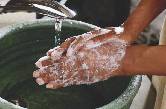
WEDNESDAY, Nov. 21 (HealthDay News) — Many hospital patients are reluctant to remind doctors or nurses to wash their hands, even if they know that their health may be at risk, a new study finds.
Researchers surveyed 200 patients who were at risk for, or who had a history of, infections with methicillin-resistant Staphylococcus aureus (MRSA) or Clostridium difficile, as well as patients who were at risk for infections associated with a central line or surgical site.
The results showed that 99.5 percent of the patients believed that health care workers were supposed to wash their hands before and after caring for patients, and 90.5 percent said health care workers should be reminded to wash their hands if they forget.
Only 64 percent, however, said they would feel comfortable reminding nurses to wash their hands and only 54 percent said they would feel comfortable reminding doctors to do so. Only 14 percent of patients said they had ever asked a health care worker to wash their hands, the researchers found.
The study appears in the December issue of the journal Infection Control and Hospital Epidemiology.
“Our study shows that patients have a good understanding of the importance of appropriate hand hygiene in the health care setting to prevent health-care-associated infections,” study co-lead author Andrew Ottum, of the University of Wisconsin, said in a journal news release.
“What is clear is that more should be done to empower patients to feel comfortable asking their health care workers to wash their hands,” he added. “This should be a focus of hand hygiene interventions.”
It is known that good hand hygiene by health care workers can help reduce the transmission of health-care-associated infections. Proper hand hygiene includes health care workers washing their hands with soap and water or using an alcohol-based hand rub before and after seeing a patient.
More information
The National Patient Safety Foundation outlines what you can do to prevent hospital infections.

